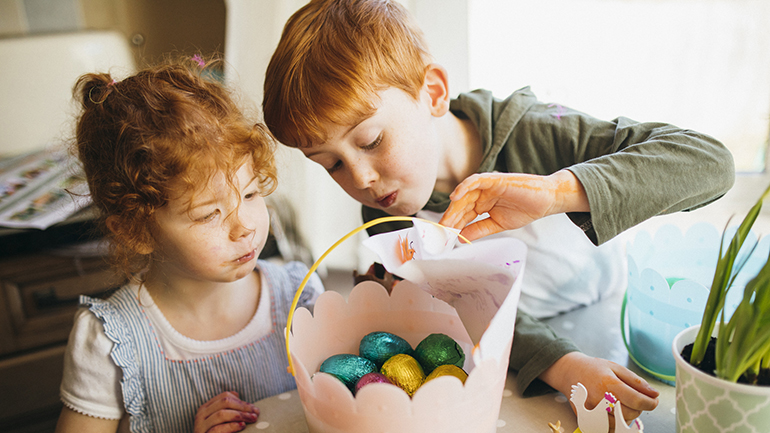
Parents and caregivers can help children build a healthy, positive relationship with chocolate this Easter as well as practice oral care.
Easter egg hunts are a time for sunshine, outdoor activities and of course – chocolate. With Easter chocolate prominently displayed on store shelves at this time of year, parents and caregivers may have concerns about how much chocolate is considered too much.
Easter egg hunts are a good opportunity to support children in developing a positive relationship with food.
Our Public Health dietitians support a concept known as ‘the division of responsibility.’ This concept outlines the roles that adults and children play when it comes to feeding and oral health.
The adult decides the what, when and where of meals and snacks and the child decides how much and whether or not they choose to eat.
In the case of Easter candy and chocolate, the adult decides when to let the child have the candy or chocolate and the child decides how much. There is no ‘right’ amount, with the goal being to teach children to regulate for themselves how much they eat.
“When children view chocolate and candy as simply another food that will be available in the future, the novelty will soon wear off,” Public Health Dietitian Gina Guo explains.
Avoid labelling chocolate as "bad"
It is important for parents and caregivers to avoid labelling chocolate as ‘bad’ or ‘unhealthy.’ Doing so can create a negative association with food and can lead to feelings of guilt or shame for children when eating certain foods.
Instead, try to focus on moderation and balance. Teach your child that it is okay to enjoy chocolate as part of a balanced diet, in addition to other categories of foods like fruits, vegetables and whole grains.
Encourage good oral hygiene
At the end of the day, after your children are done consuming their chocolate and treats, it’s good to make sure that they practice oral care by brushing their teeth, as consuming sugary foods can lead to cavities and tooth decay.
Parents and caregivers should assist children with oral care until they are at least eight years old.
Below are a few tips to help children foster a positive, healthy mindset towards food:
- Continue to offer regular meals and snacks in addition to any chocolate or candy that is offered
- Offer chocolate and candy without any strings attached (i.e. not as a reward or a bargaining tool)
- Take a neutral stance by not labelling chocolate or candy as 'bad' food, as this creates added desire
- Remember to brush your child’s teeth in the morning and before bed with fluoride toothpaste
